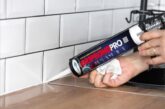
Want to keep everything above board when it comes to your choice of sealants, adhesives and building chemicals? UK-based manufacturer, Bond It can help.
Ask yourself a question. What do you know about European Regulation (EC) No 1272/2008? Or how about the GB PIC regime? Or the Biocidal Products and Chemicals (Appointment of Authorities and Enforcement) Regulations 2013?
If the answer is not a great deal, don’t worry. Manufacturer of sealants, adhesives and building chemicals, Bond It concerns itself with these important legal requirements, so you don’t have to.
“Building chemicals are arguably one of the most legislated of all construction product categories” comments Sam Birt, Regulatory & Technical Data Manager at Bond It. Each of the chemical components that make up our product formulations is subject to legal requirements such as REACH.
“Standing for Registration, Evaluation, Authorisation and restriction of Chemicals, these regulations, which were initially implemented by the European Union, have been since been replaced by laws of the same name developed by the UK Government.

Protecting people and the planet
“REACH applies to all businesses that import, make, sell or distribute chemicals whether that’s as raw materials or in their finished state. This includes those chemicals used in sealants, adhesives, preservers, waterproofing compounds and every similar building product.
“The aim of legislation like REACH is to protect human health and the environment. They’re not fixed obligations either. As our understanding of the impact of different chemicals and of less harmful alternatives grows, legal requirements can and often do evolve.”
As prime example, wood preservers are currently the focus of changes being driven by legislation known as the Biocidal Products Regulation (BPR, Regulation (EU) 528/2012). This requires the active substances employed by wood preservers in order to destroy, deter, or neutralise organisms like bacteria and fungi to be authorised by the European Chemicals Agency (ECHA).
As part of the approval process, the effectiveness of the active substance is evaluated alongside its risks. If a safer alternative can be used, even if it entails some acceptable trade off in terms of performance, then affected products may have to update their formulations or be withdrawn from the market.
Timing is everything
Updating the formulation of building chemicals in line with changing legislation is only part of the challenge. For manufacturers like Bond It, it’s just as important to pre-empt these changes and to ensure its products are ready in good time.
“Continuity of supply is just as important to Bond It as product conformity or availability” explains Sam. “If you wait until new regulations come into effect, it’s a bit like closing the stable door after the horse has bolted.
“We want to make sure there is no disruption to the trade professionals using our products and this means implementing changes to our range and rolling them out well in advance.”
Winning formulas
Reflecting its forward-looking approach, Bond It has already and proactively updated the formulation of its bitumen products. Since 2024, they have employed a type of hydrocarbon that is less hazardous to the environment.
The hydrocarbon that was previously used is not subject to any specific legislation yet, but it has been identified as a priority substance and so is likely to be the focus of pending review. As a result of this change, Bond It’s bitumen products no longer carry the labels and warning symbols for ‘Toxic to aquatic life with long lasting effects”, nor “Causes damage to organs through prolonged or repeated exposure.”
Similarly, the business is currently developing a range of oxime silicone sealants using a MEKO-free formulation that are odourless, safer for users and environmentally friendly.
For further information on Bond It go to Bond It Group.







